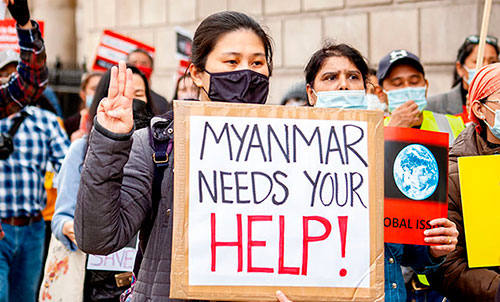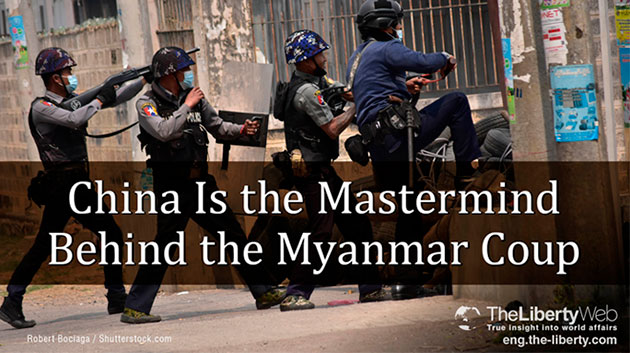China Is the Mastermind Behind the Myanmar Coup
Around four and a half months have passed since the military coup took place in Myanmar.
Many media outlets report the incident as a conflict between the Myanmar military and pro-democracy movements, but this does not reflect the reality of the matter.
(By editorial board Satoshi Yamamoto & Kofu Takeuchi)
When protestors created sandbag barricades to block military vehicles from passing by road, the military struck back with rocket launchers, and shot at the people who fled with rifles. Even the unarmed were indiscriminately blasted at and killed by mortars and machine guns. Those who were saving the severely injured were assaulted; the hospital personnel were held at gunpoint.
Located in Southeast Asia, Myanmar is facing unimaginable tragedies. Since the military coup on Feb. 1, more than 790 people have been killed (as of May 16). Sounds of bombings, dry gunshots, and the screams of those who have lost their loved ones echo throughout Myanmar: the country is in turmoil.
Assaulted Civilians’ Organs Harvested!?
The overwhelming oppression by the Myanmar military has caused the number of large protests involving hundreds of thousands of people to dwindle, but many have switched to guerilla protests to oppose the coup, which only involve a few hundred people. However, the military is arresting and detaining demonstrators at every opportunity as though its goal is to wipe out any protest movement,
“If the torture continued, I think she would definitely have died,” said a 17-year-old Myanmar woman, when interviewed by the U.S. media (see photo below).

Young people with swollen faces after an assault by Myanmar military and the police. (provided by Mr. Win Kyaw)
According to the woman, another woman who had been detained like her was assaulted by the police right from the beginning and, by the time she arrived at the interrogation room, could already not walk properly. Her mouth was torn so much that she could not eat, and her body was covered with blood.
Myanmar’s human rights organization, the Assistance Association for Political Prisoners (AAPP), announced that 3,998 people have been arrested and detained by the military (as of May 16). Many of these are young people and journalists who participated in protests, as well as celebrities and teachers who have expressed disapproval of the coup. In many cases, the civilians who merely participated in a protest or expressed their opinions opposing the coup on social media had the military barging into their homes without notice and were detained.
It is not uncommon for the Myanmar people to die from the extremely ruthless and cruel torture. The military is reluctant to return the bodies of the dead even when requested by the deceased’s family; there was even a case where they charged 12,000 kyat (around $7.29) for each body to be returned. Horrifyingly, these bodies had their stomachs sewn in a straight line, which appeared to be evidence of removed organs, raising suspicions that security officials are engaged in organ trading.
Mr. Win Kyaw, a Myanmarese residing in Japan who has been part of the democratization movement since the 1980s, has testified that “the army is not human. Their brutality is beyond normality.”
Myanmar has a tradition of warding off evil spirits by hitting metal objects. Presently, the residents of Yangon are coming out at night to bang their cymbals and pots, wishing for the evil spirit to leave. The “evil spirit” that they are referring to, obviously, is the Myanmar military.
Democracy Over My Life
The tragedy was brought about by the “evil spirit” very suddenly.
“We have obtained control over national authority.”
Myanmar’s military-run TV made this declaration nationwide on Feb. 1. State Counsellor Aung San Suu Kyi, as well as representatives and those connected with the ruling National League for Democracy (NLD), were all immediately detained. All state power was handed to Commander-in-Chief of the Armed Forces, Min Aung Hlaing. Literally, a military coup took place.
A military administration has reigned in Myanmar since the army took full control of the nation in 1962. Citizens’ thoughts have been uniformly controlled, and intelligence agencies have been used to monitor the people. The press and free speech have been strictly controlled.
However, the military administration caused the economy to fall into depression while the restrictions on freedom caused momentum for democratization to build. In 1988, Ms. Suu Kyi, along with many younger citizens, started a pro-democracy movement that was immediately suppressed by the armed forces. The military crushed any pro-democracy movements that arose.
Later, partly because of the Western economic sanctions, a general election was held, and democratization was realized in 2015 when the NLD, led by Ms. Suu Kyi, took over the administration. They won a huge victory in the general election last year and were just about to make a constitutional amendment to weaken the influence of the military when the coup took place.
“My friend lost his life when he participated in a protest in Yangon. Still, I just can’t stop my siblings and friends form participating in these protests. Democratization must be realized at any cost,” said a Myanmarese living in the Oita prefecture of Japan.
They want to save their compatriots living in the country and reestablish democracy. By the beginning of May, protests calling for a “Spring Revolution” were held in various major cities around the world, including Tokyo and New York. The Myanmar people who participated in these demonstrations raised three fingers to symbolize “freedom,” “equality” and “justice” to protest against the military coup.
“I work in Japan, but I actually want to work for my homeland, Myanmar. If things stay the way they are, companies and the younger people will disappear from Myanmar. I cannot stand around and do nothing for the future of the country,” said the Myanmarese.

JessicaGirvan / Shutterstock.com
‘How Many Must Die For the U.N. to Take Action?’
Contrary to such voices, however, the international community is yet to make a resolute response. The United Nations (U.N.) Security Council has raised the topic of sanctions against the Myanmar Armed Forces, but China remains opposed, preventing the sanctions from being implemented.
As for Japan, the country has, for many years, supported Myanmar’s Official Development Assistance (ODA), and many manufacturing industries have also entered its market.
However, the Japanese government fears that the ODA loans will become non-performing, making it reluctant to stand by the sanctions. While more than 90 percent of Myanmar residents in Japan want the sanctions, the nation maintains it position of keeping the ties with the Armed Forces.
“How many must die for the U.N. to take action?” The cries of the Myanmar people echo around the world. The following passage of a poem was posted on social media, portraying the feelings of the Myanmar people:
“A heartbroken bird…
Pipita, it screams.
The world is yet to calm,
Many lives fall.
A broken-hearted bird…
We did scream, loud and clear.
Yet, the world is but
A deaf person.
Many lives were lost.”
Why did the Armed Forces stage a coup and intensify their military oppression?
Master Ryuho Okawa, CEO of Happy Science, recorded a spiritual reading titled, “Spiritual Messages from the Guardian Spirit of Aung San Suu Kyi – Will peace come to Myanmar? –” on March 11. Ms. Suu Kyi’s guardian spirit claimed that “[China] is trying to create a ‘puppet government,’” and that “Myanmar’s Armed Forces are only trying to take advantage of China’s support, but China actually has thoughts of taking over.”
Meanwhile, the guardian spirit of Mr. Hlaing stated that he had a deep connection with China, and that President Xi Jinping told him about China’s invasions plans that even included India, indicating that China was behind the coup.
If Myanmar’s citizens see the Armed Forces as an “evil spirit,” they will definitely see China, who is controlling the coup behind the scenes, as a “devil.”



















